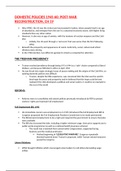DOMESTIC POLICIES 1945-60: POST-WAR
RECONSTRUCTION, CH 19
After WW2, the US was the richest and most powerful nation, where people lived in an age
of abundance, and emerged from the war in a sustained economic boom, with higher living
standards than any other nation
However, it also was an age of anxiety, with the tensions of nuclear weapons and the Cold
War
o Initially, the US went through a ‘red scare’ that was worse than the first following
WW1
Beneath the prosperity and appearance of social conformity, social, cultural and ethnic
divisions were stirring
In the 1960 election, two different agenda for America competed for attention
THE TRUMAN PRESIDENCY
Truman reached presidency through being V.P in 1944 as a ‘safe’ choice compared to liberal
Wallace, and because FDR died in office in April 1945
He was thrust into major strategic issues of peace-making and the origins of the Cold War, so
tackling domestic policies was difficult
o Truman, despite his little experience, was convinced that the USA was the world’s
best hope for peace and prosperity and he believed that this hope could be best
realised if the USA developed a political and social system, it could be an example to
the rest of the world
REFORMS-
Reforms were to consolidate and extend policies previously introduced by FDR to protect
workers’ rights and maintain full employment
Full Employment Bill, 1945
His immediate concern was employment so in 1945 introduced the Full Employment Bill to
Congress (proposed the Fair Employment Practises Commission to be made permanent)
The Bill declared employment to be a right and required the government to ensure that jobs
were available
The Bill also increased the dole, including a higher minimum wage, farm price supports and a
public works programme (as well as a national health insurance scheme)
o The result was a backlash from conservative Congressmen, supported by big
business and the medical profession
Marked beginning of ‘LEGISLATIVE WARFARE’; Congress repeatedly
blocked/watered down Truman’s proposals, while Truman vetoed measures
passed by Congress
Labour Relations-
WW2 brought inflation which encouraged union leaders to call strikes demanding wage
strikes





